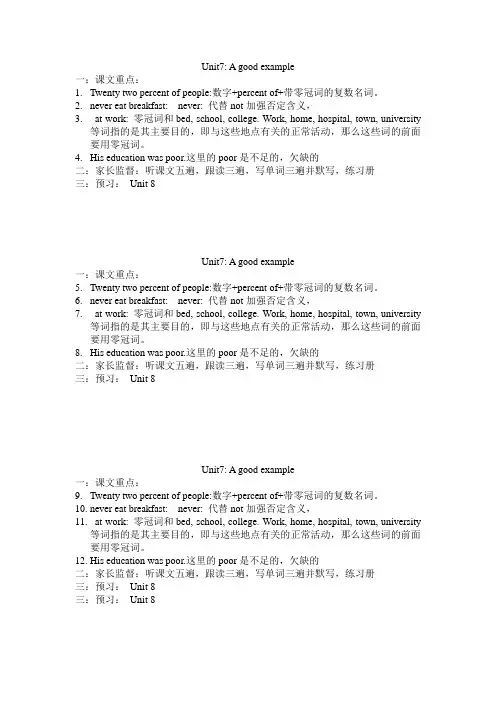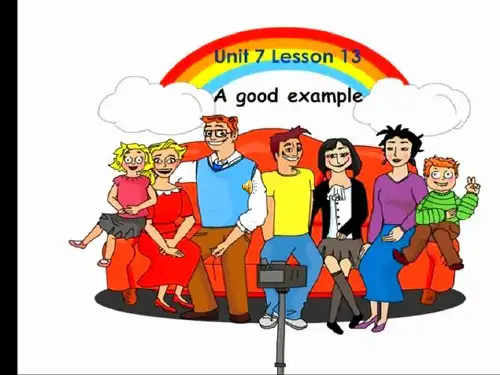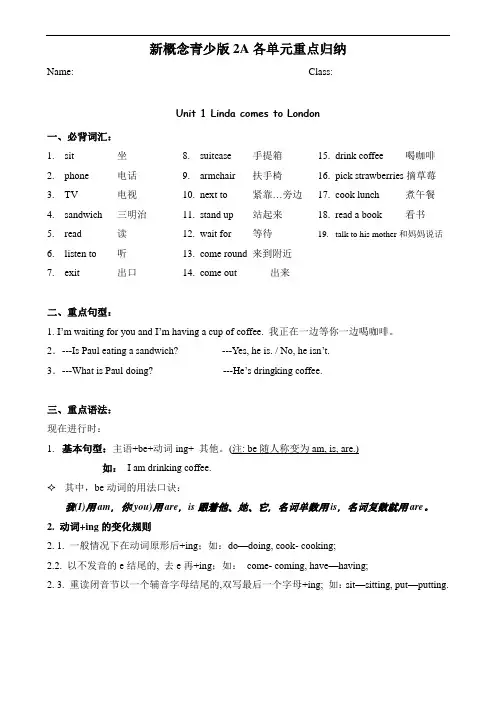(完整版)青少版新概念2Aunit7知识点总结
新概念英语青少版2A7

Unit7: A good example一:课文重点:1.Twenty two percent of people:数字+percent of+带零冠词的复数名词。
2.never eat breakfast: never: 代替not加强否定含义,3.at work: 零冠词和bed, school, college. Work, home, hospital, town, university等词指的是其主要目的,即与这些地点有关的正常活动,那么这些词的前面要用零冠词。
4.His education was poor.这里的poor是不足的,欠缺的二:家长监督:听课文五遍,跟读三遍,写单词三遍并默写,练习册三:预习:Unit 8Unit7: A good example一:课文重点:5.Twenty two percent of people:数字+percent of+带零冠词的复数名词。
6.never eat breakfast: never: 代替not加强否定含义,7.at work: 零冠词和bed, school, college. Work, home, hospital, town, university等词指的是其主要目的,即与这些地点有关的正常活动,那么这些词的前面要用零冠词。
8.His education was poor.这里的poor是不足的,欠缺的二:家长监督:听课文五遍,跟读三遍,写单词三遍并默写,练习册三:预习:Unit 8Unit7: A good example一:课文重点:9.Twenty two percent of people:数字+percent of+带零冠词的复数名词。
10.never eat breakfast: never: 代替not加强否定含义,11.at work: 零冠词和bed, school, college. Work, home, hospital, town, university等词指的是其主要目的,即与这些地点有关的正常活动,那么这些词的前面要用零冠词。
青少版新概念英语2A Unit7

Listen to the recording, and then answer these questions:
Is William a good example? Why? / Why not?
Listening and Understanding
ROBERT: How about this,Dad?
has her breakfast at work everyday . It’s a waste of time, really.
“值得同情的”
KAREN: Poor,girl!
She works very hard.
WILLLAM:She goes out
with friends nearly every night.
语音练习
A pass city mess
B lesson rice dish
C Russia Lucy mission
D class climb patient
Before the lesson
Q1: When do you have your breakfast? Q2: Where do you have it? Q3: How about your parents(父母)? Q4: Do you think it is right to have the breakfast at home ? on the way? at school? at work?
London/visit/once/year/a/they/usully They usually visit London once a year.
New Words and Expressions
青少版新概念2A_第七单元

英语文化背景和跨文化交际介绍
英语文化背景: 介绍英语国家 的历史、文化、
风俗习惯等
跨文化交际: 介绍不同文化 背景下的交际 方式、礼仪、
禁忌等
英语语言特点: 介绍英语语言 的特点如词汇、 语法、发音等
跨文化交际技 巧:介绍如何 在跨文化交际 中避免误解和 冲突提高沟通
效率
教学方法
讲解与示范相结合
词汇和语法讲解
词汇:学习新词汇理解词义和用 法
练习:通过练习巩固词汇和语法 知识
添加标题
添加标题
添加标题
添加标题
语法:学习新的语法点理解语法 规则和用法
应用:在实际生活中应用所学词 汇和语法知识
课文阅读和写作练习
课文阅读:阅读课文理解课文内容掌握课文中的词汇和语法知识。 写作练习:根据课文内容进行写作练习提高写作能力。 阅读理解:通过阅读课文理解课文中的主题和思想提高阅读理解能力。 写作技巧:学习写作技巧提高写作水平。
利用多媒体和网络资源
多媒体教学:利用视频、音频、图片等素材增强教学效果 网络资源:利用网络资源如网络课程、在线题库等提高学习效率 互动教学:利用多媒体和网络资源进行互动教学提高学生参与度 自主学习:利用多媒体和网络资源引导学生进行自主学习提高学习主动性
课堂互动游戏和角色扮演
游戏目的:提高学生参与 度和学习兴趣
语言运用:提高语言运用能力如 语法、句型、修辞等
培养英语口语表达和听力理解能力
口语表达:通过模仿、练习和交流提高英语口语表达能力 听力理解:通过听、说、读、写等多种方式提高英语听力理解能力 语言环境:创设英语语言环境提高英语口语表达和听力理解能力 互动交流:通过小组合作、角色扮演等方式提高英语口语表达和听力理解能力
新概念青少版2A各单元重点归纳

新概念青少版2A各单元重点归纳Name:___________________ Class:___________________Unit 1 Linda comes to London一、必背词汇:1.sit 坐2.phone 电话 电视4.sandwich 三明治5.read 读6.listen to 听7.exit 出口8.suitcase 手提箱9.armchair 扶手椅10.next to 紧靠…旁边11.stand up 站起来12.wait for 等待e round 来到附近e out 出来15.drink coffee 喝咖啡16.pick strawberries摘草莓17.cook lunch 煮午餐18.read a book 看书19.talk to his mother和妈妈说话二、重点句型:1. I’m waiting for you and I’m having a cup of coffee. 我正在一边等你一边喝咖啡。
2.---Is Paul eating a sandwich? ---Yes, he is. / No, he isn’t.3.---What is Paul doing? ---He’s dringking coffee.三、重点语法:现在进行时:1.基本句型:主语+be+动词ing+ 其他。
(注: be随人称变为am, is, are.)如:I am drinking coffee.其中,be动词的用法口诀:我(I)用am,你(you)用are,is跟着他、她、它,名词单数用is,名词复数就用are。
2. 动词+ing的变化规则2. 1. 一般情况下在动词原形后+ing;如:do—doing, cook- cooking;2.2. 以不发音的e结尾的, 去e再+ing;如:come- coming, have—having;2. 3. 重读闭音节以一个辅音字母结尾的,双写最后一个字母+ing; 如:sit—sitting, put—putting.Unit 2 Good luck on Sunday!一、重点词汇:1.visit 参观,访问2.visitor 参观者3.noisy 嘈杂的4.village 村庄ugh 大笑6.film 电影7.say 说话8.town 市镇,城镇9.city 城市10.radio 收音机11.learn 学习12.news 新闻13.quiet 安静的14.television 电视机15.luck 运气16.center 中心e home 回家18.listen to the radio听收音机19.learn English 学习英语20.watch the news 看新闻21.play football 踢足球22.have lunch 吃午餐23.go out 外出24.hundreds of 数以百计的25.thousands of 数以千计26.look forward to 盼望,期望二、重点句型:1. --- Are Robert and Lucy waiting for a taxi? 罗伯特和露西在等出租车么?---Yes, they are. / No, they aren’t.2. ---What are Robert and Lucy doing? 罗伯特和露西在做什么?--- They are waiting for a bus. 他们正在等公交车。
新概念英语2A L7)青少版新概念2A Unit7

William: Then she has breakfast at her desk! It doesn’t look good.
具体地点用介词 at,表示“在…旁”
Activity
Make sentencens.
Example: My teacher waters flower one hundred times a day.
表示次数的提问:How many times
表示多久一次的提问:How often
她多久加一次班?
How often does she work late? 她一周加几次班?
William: She goes out with friends nearly ____ every night. ['nɪəli] gets up Then she __________ late, and rushes to work____. late William: Then she has breakfast at her desk! It doesn’t look good. twice a week, too Karen: She works late _______ [twaɪs] William: Well, we all do that. Goodness, is that the time? rush William: I must______.
Can you give me more examples? (1,3,5分)
--How often does he go to the cinema?
新概念英语青少版2A Unit7 A good example

New words and expressions
• example [ɪɡˈzæmpəl] n. 例子 • a waste of time 浪费时间 • hard [hɑ:d] adv. 努力地 • nearly [ˈniəli] adv. 几乎,差不多 • get up v. + adv. 起床 • late adv. 晚地 • rush[rʌʃ] v. 冲,奔 • twice[twaɪs] adv. 两次
Unit 7 A good example
好榜样
have breakfast
I usually have my breakfast at home.
Questions
1. Does William’s assistant have her
breakfast at home every day? No, she doesn’t.
祖母,外祖母 • seaside [ˈsiˌsaɪd] n. 海边,海滨 • medicine [ˈmɛdɪsɪn] n. 药 • fortnight [ˈfɔ:tnaɪt] n. 两星期 • grandparent n. (外)祖父母
Unit 7 A good example
• Robert: How about this, Dad?
Twenty-two percent of people.
4. What does William’s assistant do nearly every night?
She goes out with friends.
5. Who can get any breakfast at work? William can get some breakfast at work.
青少版新概念2A unit 7 知识点总结
辅导讲义学员姓名:Jnce2a 年级:科目: Jnce2a 学科教师:Bella授课日期2018.7.14授课时段周六8:00-10:00授课主题Unit 7 A good example教学内容课前回顾包括上次课的课后作业讲解、单词听写、错题重现、日校答疑、重难点回顾等……Unit语法:对频率的提问how often ...频率的表达:twice a week; once a year一般现在时的三单问题:动词第三人陈单数变化规则:1)一般直接在动词尾直接加s.如:know—knows,help—helps, get—gets2) 以字母s、x、ch、sh结尾的动词加-es 发音/iz/;如:guess—guesses,fix—fixes,teach—teaches,brush—brushes,watch—watches,catch—catches3) 以辅音字母+y结尾的动词,先变y为i,再加-es.发音/z/如:study—studies,carry—carries,fly—flies,worry—worries词汇:example n. 例子 a waste of time 浪费时间hard adv. 努力地nearly adv. 几乎,差不多get up v. + adv. 起床late adv. 晚地rush v. 冲,奔twice adv. 两次goodness! Int. 天哪,哎呀!once adv. 一次,一回exactly adv. 确切地,精确地grandmother n. 祖母,外祖母seaside n. 海边,海滨medicine n. 药fortnight n. 两星期grandparent n. (外)祖父母重点句型:★ How many times a week does he go to the cinema?Once.★ How often do they go the theatre?Once a month.作业:1.微信熟读P.2.背诵单词短语,下节课听写3.完成练习册4.每天听语音资料15分钟并大声跟读。
青少版新概念2A_unit7(共55页)
works late
four times a year
goes for a work
eg: We usually listen to the news three times a day. He usually takes his medicine twice a week.
How often do you have a bath?
Yes, they do.
Example:
William’s assistant / breakfast / work / every day?
Does William’s assistant have breakfast at work every day?
Yes, she does.
Example:
William / get / breakfast / work?
Where does William get breakfast ? At work.
T: Do you often have breakfast at home? W: Not very often. I usually have breakfast at work. T: Do you ever eat breakfast in the canteen? W: Yes. I have breakfast in the canteen with my family. T: How often do you have breakfast in the canteen? W: Once a week. T: What time do you usually have breakfast? W: At 8. T: And what do you have? W: Milk and bread.
新概念英语青少版2A知识点整理
新概念英语青少版2A知识点整理Lesson1-2四会词汇:next to 紧靠…旁边,挨着wait for 等待come round 来到附近stand up 起立,站起来come out 出来sit 坐phone 电话TV电视Sandwich 三明治read 读listen to 听三会词汇:Arrivals (机场的)进港处exit 出口Baggage Hall 行李领取处suitcase 手提箱,皮箱armchair 扶手椅1. Here you are. 给你2. There it is. 它在这。
Lesson3-4四会词汇:visit 参观,访问noisy 嘈杂的,喧闹的hundreds of 数以百计的thousands of 数以千计village 村庄laugh 大笑look forward to 盼望,期望film 电影say 说话town 市镇,城镇city 城市radio 收音机learn 学习news 新闻come home 回家quiet 安静的三会词汇:television 电视机luck 运气center 中心trade fair 贸易博览会exhibitor 参展者visitor 参观者competitor 竞争者,参赛者spirit 本质,精神句型:1. Are Robert and Lucy waiting for a taxi? 罗伯特和路西在等出租车么?2.What are Robert and Lucy doing?罗伯特和路西在做什么?俚语:That’s the spirit.这就对了。
Good luck!好运!Lesson5-6四会词汇:yours 你(们)的(所有物)strange 奇怪的mine 我的(所有物)belong to 属于his 他的(所有物)airport 飞机场pick up 接back 回原处hers她的(所有物)ours我们的(所有物)theirs他(她,它)们的(所有物)三会词汇:note 便条pocket 口袋,衣袋handwriting 笔迹‘to-do’list 任务清单training run 长跑训练句型:1. whose …?提问谁的2. who does this … belong to?这个属于谁?3. It belongs to….它属于…1. let sb. do sth.2. give sb. sth. / give sth. to sb.Lesson 7-8四会词汇:hour 小时put on 穿上walk 走take off 脱下turn on 打开turn off 关掉letter 信throw away 扔掉三会词汇top three percent 最好的百分之三volunteer 自愿者Congratulations! 祝贺Well done! 做得很好!foil jacket 保暖夹克hero英雄this way 这边medal 奖章put up 挂起curtain 窗帘take down 拿下picture 图画so 非常pleased 高兴的Best wishes 最美好的祝福句型:1. Are you going to have a drink?你打算去喝些东西么?2. I’m going to have lunch.我打算去吃午餐。
新概念青少版2A各单元重点归纳
新概念青少版2A各单元重点归纳Name:___________________ Class:___________________Unit 1 Linda comes to London一、必背词汇:1.sit 坐2.phone 电话 电视4.sandwich 三明治5.read 读6.listen to 听7.exit 出口8.suitcase 手提箱9.armchair 扶手椅10.next to 紧靠…旁边11.stand up 站起来12.wait for 等待e round 来到附近e out 出来15.drink coffee 喝咖啡16.pick strawberries摘草莓17.cook lunch 煮午餐18.read a book 看书19.talk to his mother和妈妈说话二、重点句型:1. I’m waiting for you and I’m having a cup of coffee. 我正在一边等你一边喝咖啡。
2.---Is Paul eating a sandwich? ---Yes, he is. / No, he isn’t.3.---What is Paul doing? ---He’s dringking coffee.三、重点语法:现在进行时:1.基本句型:主语+be+动词ing+ 其他。
(注: be随人称变为am, is, are.)如:I am drinking coffee.其中,be动词的用法口诀:我(I)用am,你(you)用are,is跟着他、她、它,名词单数用is,名词复数就用are。
2. 动词+ing的变化规则2. 1. 一般情况下在动词原形后+ing;如:do—doing, cook- cooking;2.2. 以不发音的e结尾的, 去e再+ing;如:come- coming, have—having;2. 3. 重读闭音节以一个辅音字母结尾的,双写最后一个字母+ing; 如:sit—sitting, put—putting.Unit 2 Good luck on Sunday!一、重点词汇:1.visit 参观,访问2.visitor 参观者3.noisy 嘈杂的4.village 村庄ugh 大笑6.film 电影7.say 说话8.town 市镇,城镇9.city 城市10.radio 收音机11.learn 学习12.news 新闻13.quiet 安静的14.television 电视机15.luck 运气16.center 中心e home 回家18.listen to the radio听收音机19.learn English 学习英语20.watch the news 看新闻21.play football 踢足球22.have lunch 吃午餐23.go out 外出24.hundreds of 数以百计的25.thousands of 数以千计26.look forward to 盼望,期望二、重点句型:1. --- Are Robert and Lucy waiting for a taxi? 罗伯特和露西在等出租车么?---Yes, they are. / No, they aren’t.2. ---What are Robert and Lucy doing? 罗伯特和露西在做什么?--- They are waiting for a bus. 他们正在等公交车。
- 1、下载文档前请自行甄别文档内容的完整性,平台不提供额外的编辑、内容补充、找答案等附加服务。
- 2、"仅部分预览"的文档,不可在线预览部分如存在完整性等问题,可反馈申请退款(可完整预览的文档不适用该条件!)。
- 3、如文档侵犯您的权益,请联系客服反馈,我们会尽快为您处理(人工客服工作时间:9:00-18:30)。
★ How many times a week does he go to the cinema?
Once.
★ How often do they go the theatre?
Once a month.
作业:
1.微信熟读P.
2.背诵单词短语,下节课听写
3.完成练习册
4.每天听语音资料15分钟并大源自跟读。get up v. + adv.起床late adv.晚地rush v.冲,奔twice adv.两次
goodness! Int.天哪,哎呀!once adv.一次,一回exactly adv.确切地,精确地
grandmother n.祖母,外祖母seaside n.海边,海滨medicine n.药fortnight n.两星期grandparent n.(外)祖父母
频率的表达:twice a week; once a year
一般现在时的三单问题:
动词第三人陈单数变化规则:
1)一般直接在动词尾直接加s.如:
know—knows,help—helps, get—gets
2)以字母s、x、ch、sh结尾的动词加-es发音/iz/;如:
guess—guesses,fix—fixes,teach—teaches,brush—brushes,
辅 导 讲 义
学员姓名:Jnce2a 年 级: 科目: Jnce2a 学科教师:Bella
授课日期
2018.7.14
授课时段
周六8:00-10:00
授课主题
Unit 7A good example
教学内容
课前回顾
包括上次课的课后作业讲解、单词听写、错题重现、日校答疑、重难点回顾等……
Unit
语法:
对频率的提问how often ...
watch—watches,catch—catches
3)以辅音字母+y结尾的动词,先变y为i,再加-es.发音/z/如:
study—studies,carry—carries,fly—flies,worry—worries
词汇:
example n.例子a waste of time浪费时间hard adv.努力地nearly adv.几乎,差不多
